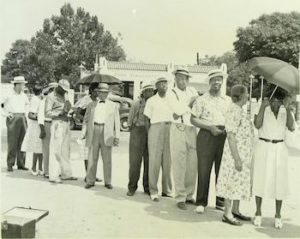
*On this date in 1948, Brown v. Baskin was ruled. This was one of the legal building blocks against voter suppression against Black citizens in the United States.
One month after the South Carolina General Assembly repealed all statutes related to party primaries in the state to maintain its white primary, Black leaders formed the Progressive Democratic Party to challenge the white primary system. In 1946, George Elmore, a Black man eligible to vote in general elections, was denied the right to vote in the Democratic Party primary in Richland County, where party nominees for the U.S. Senate, the U.S. House of Representatives, and state offices were chosen.
Citing several provisions of the U.S. Constitution, Elmore claimed that his race violated his right to choose members of Congress. He also argued that his right to participate on an equal basis in state and federal elections had been denied since the primaries controlled the choice of elected officials. U.S. District Judge J. Waties Waring, a native Charleston resident, heard the case. Waring noted that since 1900, every governor and member of the General Assembly and Congress elected in the general election had been the nominee of the state’s Democratic Party, which during the previous twenty-five years was the only party in South Carolina holding statewide primaries.
He concluded that the repeal of all statutes and regulations in 1944 made no appreciable difference in the selection process of state officials and that the sole purpose of repealing the statutes and constitutional provisions was to prevent blacks from voting. Waring concluded that the state’s Democratic Party was acting for and on behalf of the citizens of South Carolina and that the party’s primary election was the only practical place where the voters could select elected officials at the federal and state levels. He added that it was “time for South Carolina to rejoin the Union. It is time to fall in step with the other states and to adopt the American way of conducting elections.”